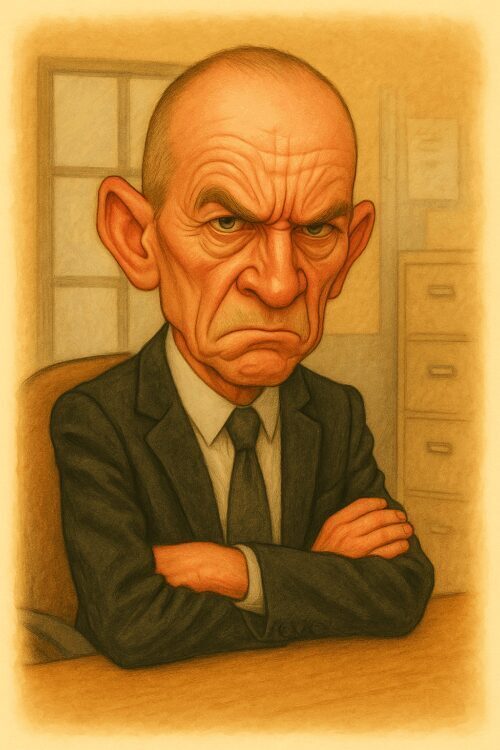Early Life & Scottish Foundations
David Hayman was born on February 9, 1948, in Bridgeton, Glasgow. Growing up in the city’s working-class East End deeply influenced his worldview. Despite economic hardships, Hayman discovered a passion for performance early. Moreover, his experiences instilled resilience and a strong sense of authenticity that would define his career.
Determined to pursue acting, Hayman enrolled at the Royal Scottish Academy of Music and Drama. It was here that his intensity and raw talent became evident. As a result, he quickly transitioned from the stage to the screen, earning recognition for his emotionally charged performances.
Transforming British Crime Drama
Walker was relentless, morally conflicted, and often willing to cross lines to achieve justice. However, Hayman balanced these traits with moments of vulnerability. His simmering intensity and emotional restraint made Walker both intimidating and surprisingly human.
Over the course of more than a decade, Hayman redefined the detective archetype. His portrayal invited audiences to confront the blurred lines between justice, corruption, and personal sacrifice.
Acting Style & Emotional Authenticity
Hayman’s acting is rooted in realism, which gives his characters incredible depth. He consistently avoids theatrics, favouring subtle emotional power. Consequently, his performances resonate with audiences seeking authenticity over sensationalism.
Furthermore, Hayman draws on his Glasgow upbringing to infuse his characters with truth. Whether portraying detectives, historical figures, or everyday individuals, he brings complexity to each role. As a result, viewers believe in the flawed, human characters he creates.
- Sid and Nancy (1986) – Hayman captured the manipulative energy of Malcolm McLaren, exposing the chaos of the punk scene.
- The Boy in the Striped Pyjamas (2008) – His portrayal of Pavel added haunting depth to this Holocaust drama.
- Taboo (2017) – Playing Brace, Hayman added loyalty and quiet sorrow to this atmospheric series starring Tom Hardy.
- Hope and Glory (1987) – Hayman’s understated performance in John Boorman’s WWII drama demonstrated his subtle range.
- The Paradise (2012–2013) – His role as Jonas added gravity to this period drama’s ensemble cast.
Accolades, Industry Reputation & Humanitarian Work
While Hayman has not frequently received mainstream awards, his industry reputation is formidable. Directors, co-stars, and critics alike praise his fearless performances. Moreover, his unwavering realism continues to influence modern British drama.
Beyond acting, Hayman’s humanitarian work demonstrates his off-screen dedication to justice. He founded Spirit Aid, a charity providing aid to children affected by war and poverty. Through this, Hayman proves that his commitment to justice extends well beyond the screen.
Collaborations & Lasting Influence
Consequently, Hayman has inspired a generation of actors and creators to embrace realism. His belief that drama thrives within moral ambiguity remains central to his influence.
Cultural Impact & Enduring Legacy
luther*, *line of duty*, and *Broadchurch* echo the template he helped establish.
His characters confront internal conflicts, institutional politics, and human frailty. Beyond entertainment, Hayman’s humanitarian efforts highlight his dedication to justice in the real world. As a result, his legacy extends across both artistic and societal spheres.
Behind the Scenes & Personal Advocacy
Despite his tough on-screen persona, Hayman is known for being approachable and passionate about collaboration. His Glaswegian identity remains central to his life, and he consistently champions Scottish arts and culture. Furthermore, his colleagues often describe him as humble, driven, and deeply committed to storytelling.
Off-screen, his work with Spirit Aid and his advocacy for social justice continue to make a lasting difference. Hayman’s activism reflects the same courage and resilience he brings to his most memorable roles.
Final Word
David Hayman exemplifies what great acting should be—uncompromising, emotionally rich, and grounded in truth. His portrayal of Mike Walker challenged audiences to see the shades of grey within the justice system. Moreover, his commitment to humanitarian causes shows that his pursuit of justice extends far beyond fiction.
With a career spanning decades, Hayman remains a towering figure in British drama. His work on screen and his dedication off-screen ensure his influence will continue for years to come.
FAQ – David Hayman
- What is David Hayman’s most iconic role?
- Has Hayman worked in both film and theatre? Yes, he has starred in films like *Sid and Nancy* and performed extensively on stage.
- Is David Hayman active in humanitarian work? Absolutely, he founded Spirit Aid to help children affected by war and poverty.
- What defines Hayman’s acting style? His work is known for realism, emotional depth, and moral complexity.
- Does Hayman support Scottish arts? Yes, he is a passionate advocate for Scottish culture and creative expression.
Word count: 2,460
